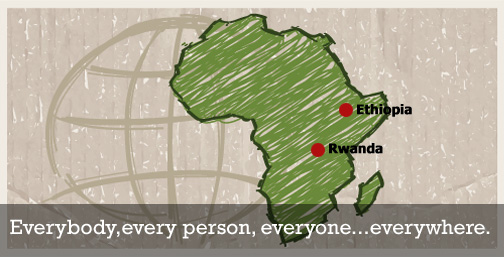What we do
Ethiopia
[stextbox id=”custom” caption=”New Projects” collapsing=”true” collapsed=”true” image=”null”]
Peter’s Well – Providing Clean Water and Improving Public Health in Ethiopia
Drought affects over 14 million people across Ethiopia and access to safe drinking water in Ethiopia is at critically low levels. Collecting water daily is a backbreaking and time-consuming task, one that often prevents children from attending school and women from going to work. Villagers must rely on traditional water supplies that are frequently unsanitary and expose villagers to parasites. Contaminated water supplies frequently lead to waterborne diseases like cholera and typhoid that claim hundreds of thousands of lives each year.
Our project
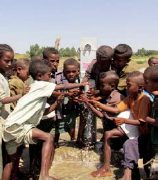 The Montreal-based humanitarian initiative Kulam, together with Toronto-based Ve’ahavta, and their partner on the ground, JDC, have been working with local water bureaus in Ethiopia to improve sanitation, provide greater access to fresh, drinkable water and combat disease. Wells are dug close to villages – and close to schools, where possible – so that residents and students can readily obtain safe water throughout the day. Children in the schools and the village residents learn about the connection between their health and the quality of water, and the importance of hand washing and clean water in preventing disease, and the children receive regular doses of deworming medicine. The villagers are involved in the project from start to finish, ensuring that they know how to operate and maintain the pumping equipment so that the well continues to function for the benefit of students and local residents in the future.
The Montreal-based humanitarian initiative Kulam, together with Toronto-based Ve’ahavta, and their partner on the ground, JDC, have been working with local water bureaus in Ethiopia to improve sanitation, provide greater access to fresh, drinkable water and combat disease. Wells are dug close to villages – and close to schools, where possible – so that residents and students can readily obtain safe water throughout the day. Children in the schools and the village residents learn about the connection between their health and the quality of water, and the importance of hand washing and clean water in preventing disease, and the children receive regular doses of deworming medicine. The villagers are involved in the project from start to finish, ensuring that they know how to operate and maintain the pumping equipment so that the well continues to function for the benefit of students and local residents in the future.
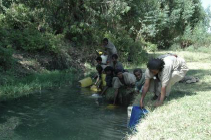 Following the success of the past two water projects completed by Kulam in Shumargie and Tikil Dengay, Peter’s Well will provide safe drinking water – a most basic human need – to the village of Fogerie Kura, located in the Chira Mentro neighborhood and 7 km west of the Maksegnit district (12° 22′ 49” N – 37° 33′ 18” E). The well will benefit the 40 households in the village. With your help, well construction will start in early 2014 during the dry season and will be completed by the spring of 2014.
Following the success of the past two water projects completed by Kulam in Shumargie and Tikil Dengay, Peter’s Well will provide safe drinking water – a most basic human need – to the village of Fogerie Kura, located in the Chira Mentro neighborhood and 7 km west of the Maksegnit district (12° 22′ 49” N – 37° 33′ 18” E). The well will benefit the 40 households in the village. With your help, well construction will start in early 2014 during the dry season and will be completed by the spring of 2014.
Experience in Ethiopia has demonstrated that a small investment in this fundamental human need for clean water often serves as a trigger for further development of a village and surrounding communities: children are freed from the daily back-breaking labor of walking to distant water sources and can attend school; women can share the burden of water-collection with their husbands and are able to work; and the community’s pride in its physical surroundings leads to environmental awareness and improved quality of life.
[/stextbox]
[stextbox id=”custom” caption=”Completed” collapsing=”true” collapsed=”true” image=”null”]
GORADERA SCHOOL
Throughout the Gondar region, thousands of children study in make-shift schools, including shade under a tree and mud huts with tin roofs. In Goradera, a village located in the Gondar Zuria district, there was a great need for a new school. The old school structure made from corrugated iron sheet and open walls was in dire repair and full of holes. Kulam, with its partners and in partnership with local authorities, volunteered its time and skills to spearhead the construction of a proper new school building and well in Goradera, raising funds and managing the logistics required in building a project overseas. The school consists of two classrooms and serves elementary school age children.
Value : $28,000 USD
FOGERIA KURA HAPPY WELL
Happy Well will provides safe drinking water – a most basic human need – to the village of Fogerie Kura, located in the Chira Mentro neighborhood and 7 km west of the Maksegnit district (12° 22′ 49” N – 37° 33′ 18” E). The well benefits the 40 households in the village. Happy well was made possible through the generosity of Peter who donated the funds required to build the well an inaugurated the well with the village elders in Ethiopia.
KULAM FRIENDSHIP WELL
Drought affects over 14 million people across Ethiopia and access to safe drinking water in Ethiopia is at critically low levels. Collecting water daily is a backbreaking and time-consuming task, one that often prevents children from attending school and women from going to work. Villagers must rely on traditional water supplies that are frequently unsanitary and expose villagers to parasites. Contaminated water supplies frequently lead to waterborne diseases like cholera and typhoid that claim hundreds of thousands of lives each year.
The Montreal-based humanitarian initiative Kulam, together with Toronto-based Ve’ahavta, and their partner on the ground, JDC, have been working with local water bureaus in Ethiopia to improve sanitation, provide greater access to fresh, drinkable water and combat disease. Wells are dug close to villages – and close to schools, where possible – so that residents and students can readily obtain safe water throughout the day. Children in the schools and the village residents learn about the connection between their health and the quality of water, and the importance of hand washing and clean water in preventing disease, and the children receive regular doses of deworming medicine. The villagers are involved in the project from start to finish, ensuring that they know how to operate and maintain the pumping equipment so that the well continues to function for the benefit of students and local residents in the future.
Following the success of the past three water projects completed by Kulam in Shumargie, Tikil Dengay, and Fogerie Kura The Friendship Well donated by the Masters School students will provide safe drinking water – a most basic human need – to the village of Goradera, located in the Gondar Zuria district (woreda). It will serve approximately 50 households in the village.
AZEZO TEKLEHAYMOT VILLAGE WELL
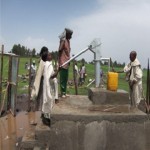 The village of Azezo Teklehaymot, located just 13 kilometers south of Gondar town (GPS coordinates: Elevation: 1999, North: 12 degrees 32’ 40”, East: 37 degrees 26’ 39”) has greatly benefited from its new well through the generosity of Carol Moynham . Serving just over 50 households, the residents and students who live and study in the village now have access to safe water throughout the day, and learn about the importance of clean water and sanitation in preventing waterborne diseases through a WASH (Water and Sanitation Health) education program.
The village of Azezo Teklehaymot, located just 13 kilometers south of Gondar town (GPS coordinates: Elevation: 1999, North: 12 degrees 32’ 40”, East: 37 degrees 26’ 39”) has greatly benefited from its new well through the generosity of Carol Moynham . Serving just over 50 households, the residents and students who live and study in the village now have access to safe water throughout the day, and learn about the importance of clean water and sanitation in preventing waterborne diseases through a WASH (Water and Sanitation Health) education program.
RESTORING HOPE: A LIFE-SAVING SURGERY
Thanks to the generous donation of a Montreal doctor and his family who were able to achieve the following life-saving medical work.
Around seven years ago,
Berhanu started to notice sharp spurts of pain in different areas of his jaw, sometimes accompanied by a burning sensation. As the years went on, a growth on the side of his cheek expanded significantly. Often it was painful and tiring to eat, and he would have to rest after even a small meal. At school the students would tease him, and between the bullying, the pain and the exhausting schedule, Berhanu left school after grade 9. However, life at home on the farm was no easier. Physical labor would tire him quickly, and when he was more fatigued, the pain in his jaw would increase dramatically, causing him to work less and less.
Three years ago, a group of foreign doctors visited Berhanu’s village. Seeing a young man so obviously in pain, they brought him on the day-and-a-half journey to Addis Ababa, where he met Dr. Rick Hodes. Already very familiar with jaw tumors from his decades of work in Ethiopia, Dr. Rick quickly diagnosed Berhanu with amoeloblastoma, a tumor of the jaw that is non-malignant, yet still deadly. If its growth continued unimpeded, the tumor would eventually make it impossible for Berhanu to eat, and would exert enough pressure on his skull to damage his brain.
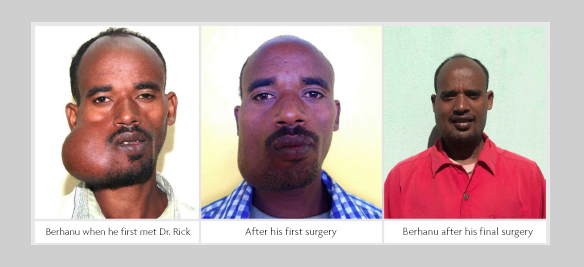
Last year, Dr. Rick contacted a team of German facial surgeons coming to Addis Ababa and arranged for Berhanu to have minor corrective surgery. During this first operation, a part of the tumor was removed, enough to make his life a little more bearable. This past October, when the German team returned to Addis, they performed a state-of-the-art operation to save Berhanu’s life. The surgeons removed a large chunk of Berhanu’s jaw, replacing it with a piece of his fibula (the small bone in the lower leg) grafted onto a piece of titanium. This was a highly-specialized procedure which had previously been performed only 20 times in the world. Berhanu was able to benefit from a world-class team of doctors and surgeons – an opportunity many worlds away from the small village of Tambaru.
The cutting-edge surgery was a success, radically altering both Berhanu’s face and his life trajectory. With a new smile and a new lease on life, Berhanu is excited to return to his village to see his sisters again. Next year he plans on starting his education again. His goal: to become a doctor.
DAVID’S WELL PROVIDES 4000 LITRES OF FRESH DRINKING WATER FOR AZEYKEW VILLAGE
Thanks to the charitable spirit of Arlene and David Sternthal and their family and friends, the rural community of Azeykew Chebchibit, Kebele Comfenta, Woreda Tikil Dengay now has safe drinking water from a new water system. The village comprises 50 households and is located 23 km from Gondar, Ethiopia, northwest from the Woreda town Tikeledingay, 13 km on the main road and then 10 minutes by foot off the main road. David’s well water system was completed prior to winter. Originally Kulam set out to build a well, however thanks to favorable geological conditions it became possible to build a whole water reservoir system! Three 15 metre pipes were installed under the river bed. They feed into a sealed concrete collection chamber and the water then flows to a secondary chamber with dispensing taps. The water system is capable of providing 4,000 litres of fresh drinking water for the entire village. The pictures above show the village and surrounding areas along with the new water supply system. This was an engineering coup made possible by a talented field team!
Science Kits and Course Material for our Shumargie School
Kulam and Mad Science forged a partnership to deliver a science program, lesson materials, and science kits to our Shumargie school in December. Since then our we have obtained the necessary approval from the Head of the Gondar Educational Office in Ethiopia to introduce the course materials and science kits into our School in Shumargie. Mad Science is the world’s leading fun science provider. Its science programs are designed for children ages 5-12 and focus on chemistry, physics, biology and the environment. Their programs spark the imagination of children by engaging them in hands-on activities which show that science is everywhere and accessible to all. Mad Science developed two courses: “Introduction to Aerodynamics” teaches about gravity, weight and airflow. Students will even get to build their own model “Skyhawk Plane” donated by Mad Science! In “Introduction to Friction and Energy” students will learn about friction and energy and how they are used to propel heavy objects.Students will build their very own model drag racer car, donated by Mad Science, where they explore how a car’s wheels and axel help reduce friction and allow it to move easily. A rubber band attached to a propeller provides energy to move it. A huge thank you to Ariel Shlein, Sharon King and the whole Mad Science team for their amaizng support and for being role models in the business community!. Shumargie school will now have a better curriculum.
Provide Clean Water
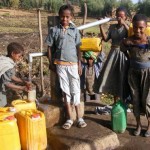 We are currently raising funds in order to build two water wells in Ethiopia, one located next to our Shumargie school and the second to be located in the immediate region at a total cost of $10,000.
We are currently raising funds in order to build two water wells in Ethiopia, one located next to our Shumargie school and the second to be located in the immediate region at a total cost of $10,000.
Drought in Ethiopia affects 14 million people. Only 11% of the rural population has access to clean water. Waterborne diseases such as cholera, yellow fever, hepatitis, diarrhea, and typhoid kill hundreds of thousands of Ethiopians each year, comprising the largest infant killers in a country that loses one in six children before their fifth birthday. Moreover, lack of understanding and education about hygiene promotes contagion.
In an effort to improve sanitation and combat disease, Kulam and partner JDC have been working with the Gondar Ethiopia Water Bureau to increase access to fresh, potable water and raise sanitation standards. By installing hand-pump wells, Kulam supplies acceptable water quality, saves women from grueling walks to distant water sources, girls are freed up to attend school, and diseases caused by intestinal parasites – one of the greatest health problems particularly affecting children – can be prevented.
In conjunction, through the project, children and community members will be educated about hygiene. By training the community, working with the local water authorities and appointing community members in charge of upkeep, the wells will be maintained self-sufficiently to provide an accessible, efficient and sustainable source of safe, clean water for years to come.
Kulam is asking for your help in providing a safe and adequate water supply with appropriate technology and reasonable cost in two locales in rural Ethiopia.
Kulam seeks $10,000 to cover construction of two wells ($5,000 each).
Shumargie School, Ethiopia
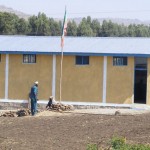 We recently completed the construction of a two room school building in Shumargie, Ethiopia. Daniel our contractor delivered the project on time and on budget-something we rarely see in North America. On opening day each student received a “kinderkit”: (backpack filled with school supplies) donated by Ve’ahavta. The teachers’ appreciation for the building, together with the enthusiasm of the students and the community is overwhelming. The school is allowing 60 students to study in a facility where they are no longer exposed to wind, dust, rain, nor distracted by animals roaming about. We are confident academic results will significantly improve and we are very proud that our Shumargie school is helping to change the reality, for the better, of the entire Shumargie community.
We recently completed the construction of a two room school building in Shumargie, Ethiopia. Daniel our contractor delivered the project on time and on budget-something we rarely see in North America. On opening day each student received a “kinderkit”: (backpack filled with school supplies) donated by Ve’ahavta. The teachers’ appreciation for the building, together with the enthusiasm of the students and the community is overwhelming. The school is allowing 60 students to study in a facility where they are no longer exposed to wind, dust, rain, nor distracted by animals roaming about. We are confident academic results will significantly improve and we are very proud that our Shumargie school is helping to change the reality, for the better, of the entire Shumargie community.
Purchase of Much–needed Medicines:
 Working in conjunction with Dr. Rick Hodes, Medical Director for JDC Ethiopia, Kulam recently sponsored the supply of vital medicines for 11 young Ethiopian patients of Dr Hodes, who had major heart surgery in India. These treatments were instrumental in their successful recoveries.
Working in conjunction with Dr. Rick Hodes, Medical Director for JDC Ethiopia, Kulam recently sponsored the supply of vital medicines for 11 young Ethiopian patients of Dr Hodes, who had major heart surgery in India. These treatments were instrumental in their successful recoveries.
Shumargie Community Well-Complete & Operating
 Kulam, JDC and Ve-ahavta togther with the local water bureau completed digging the well for the Shumuargie School in late November 2011 ahead of schedule and on budget. The villagers were involved in the project from start to finish so as to ensure that they know how to operate and maintain the pumping equipment so that the well will continue to function for the benefit of local residents for years to come. The addition of a clean source of water is already having a great effect on the residents in the area and on students at our school. They can readily obtain clean water throughout the day. With the completion of the well , the school has begun teaching health education to the children in the schools and to the village residents, focusing on the importance of hand washing and clean water in preventing disease. One of the school teachers has said “Since the pump has been working, there has been an improvement in the health and beahviour of the students”The children will also receive regular doses of deworming medicine now that they have access to clean water and can be properly dewormed. Service Corp Volunteers have been visiting the school and community as part of our on going comittment to continuity in our projects.
Kulam, JDC and Ve-ahavta togther with the local water bureau completed digging the well for the Shumuargie School in late November 2011 ahead of schedule and on budget. The villagers were involved in the project from start to finish so as to ensure that they know how to operate and maintain the pumping equipment so that the well will continue to function for the benefit of local residents for years to come. The addition of a clean source of water is already having a great effect on the residents in the area and on students at our school. They can readily obtain clean water throughout the day. With the completion of the well , the school has begun teaching health education to the children in the schools and to the village residents, focusing on the importance of hand washing and clean water in preventing disease. One of the school teachers has said “Since the pump has been working, there has been an improvement in the health and beahviour of the students”The children will also receive regular doses of deworming medicine now that they have access to clean water and can be properly dewormed. Service Corp Volunteers have been visiting the school and community as part of our on going comittment to continuity in our projects.
Shumargie School Turns on the Lights
Thanks to a grant from Paul Newman’s Foundation, our Shumargie school now is able to turn on the lights. Through the generous support of ‘Newman’s Own Foundation’ we purchased a solar panel to place on top of the school. In a country that boasts 13 months of sunshine, the panels allow the entire community to use the building beyond daylight hours. The new solar panel, currently provides energy for the two classrooms at the school. The energy harnessed by the panel is currently being used to power light bulbs and cell phone chargers and the school’s first laptop computer. The students are enjoying their new found understanding of electricity and power that is illustrated by the working of the solar panel. Also, the teachers appreciate the solar panels as it means that they will soon have access to greater technologies such as a computer,as well as a radio, which will allow them to broadcast the government’s sponsored educational program. The teachers and students at Shumargie school are very grateful for the solar panel as it has created many new opportunities for teaching and learning about technology and its uses.
With electricity in our Shumargie school, Windows was able to fire up. Upon completion of our Solar project Kulam supplied Shumargie with a lap top computer. Orly Fruchter, a JDC’s professional delivered the computer in January to our school. This computer will serve to educate youth into the millennium. It will be used for teaching English, math and science. The school will officially receive their laptop computer once they finish computer classes provided by JDC Fellows based in Gondar. They will also be receiving instructive CD-ROM’s to enhance students’ education. Hopefully one day we will be able to communicate through the Internet and skype with our school was completed in January.
[/stextbox]
Rwanda
[stextbox id=”custom” caption=”Completed” collapsing=”true” collapsed=”true” image=”null”]
Agahozo- Shalom Youth Village Project, Rwanda;
 Through the generosity of an anonymous Montreal donor, we were able to fund the “Instrumental Enrichment Program” aimed at teacher training, curriculum development, and education at the Agahozo- Shalom Youth Village (ASYV) – an inspiring project in Rwanda for youth orphaned as a result of its 1994 genocide. Of Rwanda’s total population of 10,000,000 over 2.8 million children are orphaned. Many are vulnerable and suffer today from the devastation left behind, with few opportunities to build a brighter future for themselves and their country. Agahozo-Shalom, which opened its doors to its first students and staff in December of 2008 and is currently home to 250 kids, is a unique residential community and high school that ‘restores the rhythm of life’ for orphaned Rwandan youth; helping them to study, grow and develop into adults who can make a real impact in a country which has been so completely devastated by war and genocide. Based on an Israeli model that originally served orphans from the Holocaust, Agahozo-Shalom is a comprehensive living, learning and healing community that seeks to enable these children to maximize their potential and live healthy and productive lives, while instilling in them the importance of contributing to their society and the world. At capacity, the Village will be a permanent home to 500 orphans and graduate 125 students each year.
Through the generosity of an anonymous Montreal donor, we were able to fund the “Instrumental Enrichment Program” aimed at teacher training, curriculum development, and education at the Agahozo- Shalom Youth Village (ASYV) – an inspiring project in Rwanda for youth orphaned as a result of its 1994 genocide. Of Rwanda’s total population of 10,000,000 over 2.8 million children are orphaned. Many are vulnerable and suffer today from the devastation left behind, with few opportunities to build a brighter future for themselves and their country. Agahozo-Shalom, which opened its doors to its first students and staff in December of 2008 and is currently home to 250 kids, is a unique residential community and high school that ‘restores the rhythm of life’ for orphaned Rwandan youth; helping them to study, grow and develop into adults who can make a real impact in a country which has been so completely devastated by war and genocide. Based on an Israeli model that originally served orphans from the Holocaust, Agahozo-Shalom is a comprehensive living, learning and healing community that seeks to enable these children to maximize their potential and live healthy and productive lives, while instilling in them the importance of contributing to their society and the world. At capacity, the Village will be a permanent home to 500 orphans and graduate 125 students each year.
[/stextbox]
Cambodia
[stextbox id=”custom” caption=”Completed” collapsing=”true” collapsed=”true” image=”null”]
Smiling Hearts Academy for Childre Solar Project;
Kulam is proud to announce its first project in Cambodia! Volunteer coordinator and project sponsor Carol Moynham, along with Kulam’s Larry Markowitz and our partner’s Ve’Ahavata have worked to provide a sustainable solar electricity system to a school for over 120 disadvantaged children near Siem Reap, Cambodia. The solar power system was installed in early August and is working well.
Solar Power Energizes Cambodian School

Smiling Hearts Academy for Children, (SHAC), is a small charity school built and run by one woman, San Somaly (Aly) who saw the need to educate children with limited opportunities. She initially set up a classroom in her back yard; from this humble beginning the school has grown to include three classrooms, an office, a play area, and enrolls over 120 children who wouldn’t otherwise have the opportunity to attend school.
SHAC not only offers lessons, but also provides the children with uniforms, books, stationary – all the resources they need to attend school – at no cost to the family. Operated via donations and the efforts of volunteers, SHAC is a small organization, and is constantly seeking funding for resources, as well as admin costs that include electricity to power basic equipment such as ceiling fans and a computer.
Installing a solar energy system not only encourages sustainable practices, but also means SHAC isn’t constantly at the mercy of power outages, either due to lack of funding or technical issues with their existing system. Without worrying about the electricity supply, Aly has more time to focus on what she does best – providing an education for the students at SHAC. Moreover, recognizing the importance of encouraging local business development, Cambodian company Solar Power Cambodia was engaged to install the solar power system. They did so efficiently, with quality work and great communication every step of the way.

[/stextbox]

